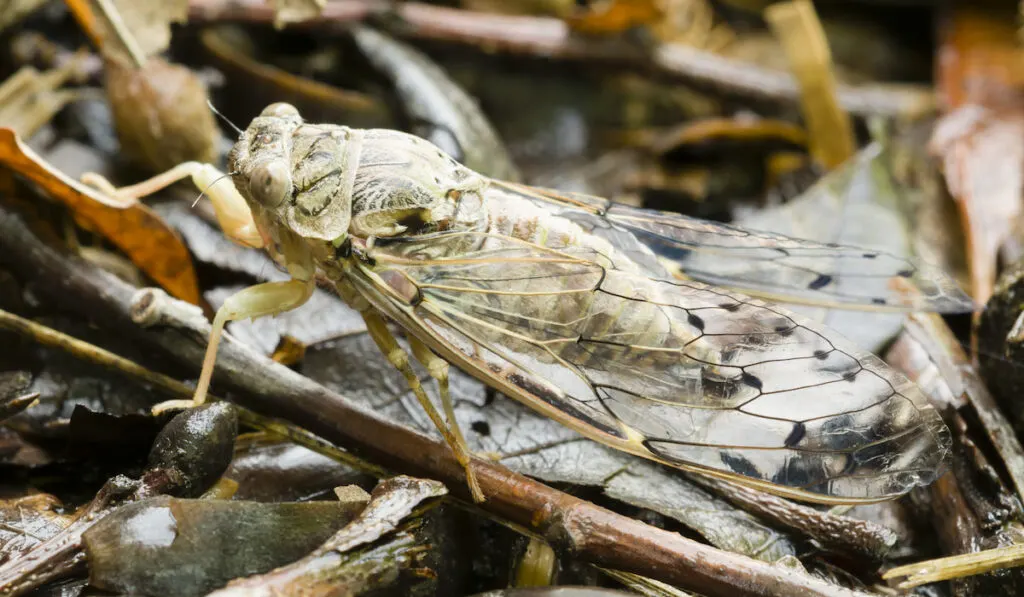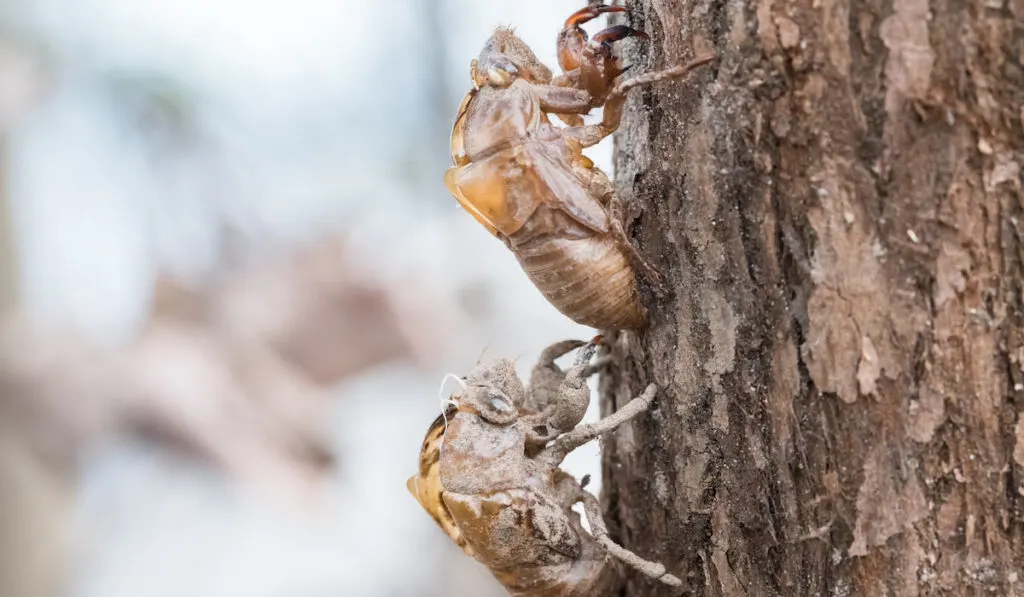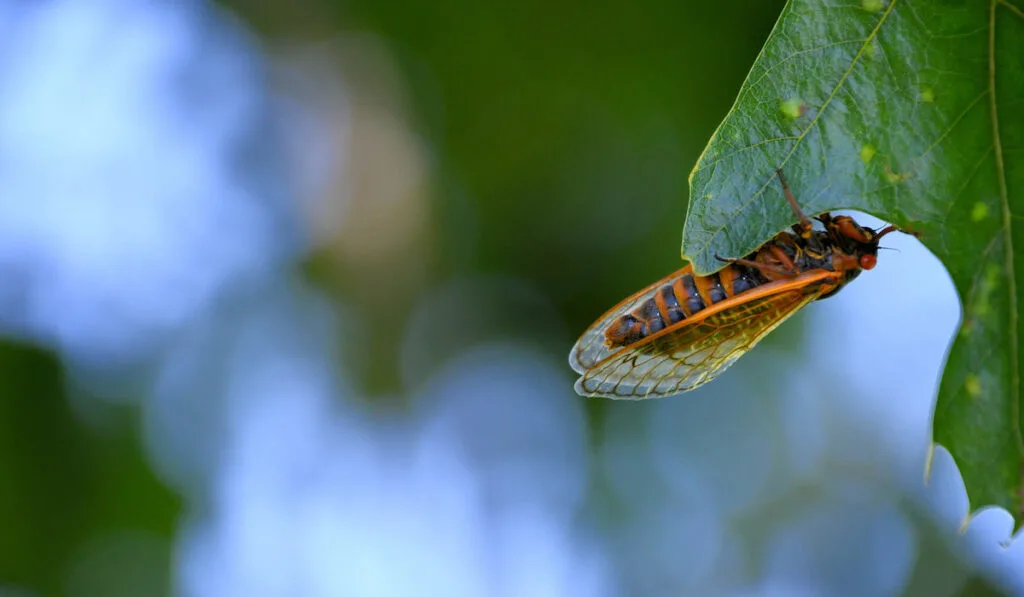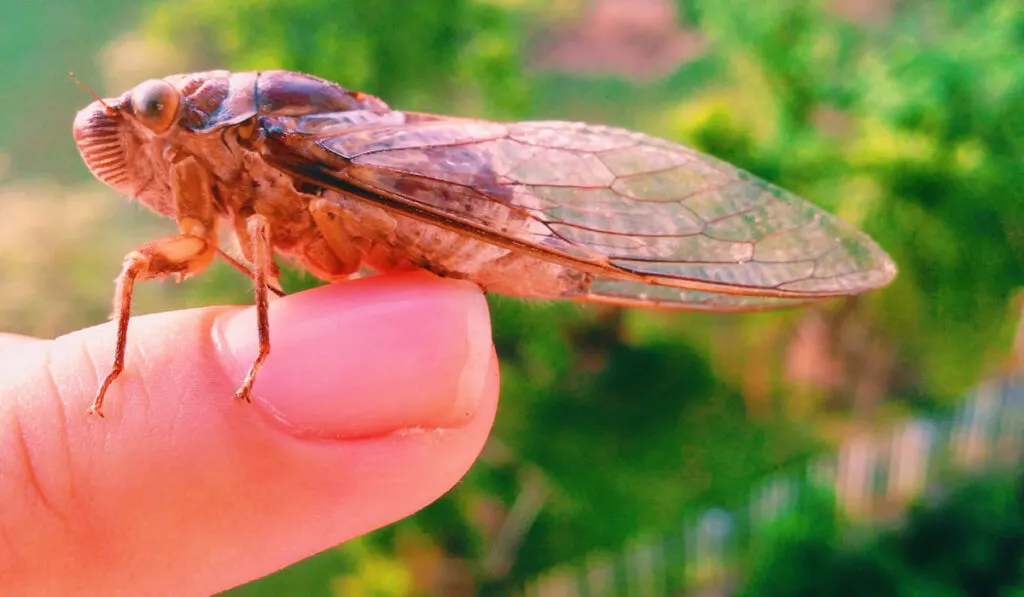If there were a list of the noisiest insect species, various cicada species would be very close to the top of that list.
These insects of the Hemiptera order are known for their clicking and buzzing noises.
The sounds cicadas produce can be particularly earsplitting when many of them sing at the same time.
These noisy insects produce sounds for a number of reasons and in different ways.
In this article, we’re going to take a closer look at some facts about cicada noise.

Table of Contents
How Long Do Cicadas Make Noise?
Cicadas typically make a lot of noise when they are trying to attract a mate. The noise they make may last over the entire summer season.
Male adult cicadas are responsible for making mating calls, and when they finally mate, they die off.
Adult cicadas usually live for 4-6 weeks during which they mate and die. So, you can expect individual cicadas to make noise for 4-6 weeks.
The duration for which cicadas make noise per day differs across the species. Morning Cicadas, for instance, make noise in the morning.
Periodical Cicadas typically sing between 10 am and 5pm. Coastal Scissor Grinder Cicadas may sing all through the day.
How to Make Cicadas Be Quiet
Cicadas can be extremely noisy, and without a doubt, the noise can be very annoying. But how can you make them quiet?
One of the best ways to make cicadas quiet is to not discourage them from frequenting your garden. Cicadas are attracted to many items in a garden.
One such feature of gardens that attract cicadas is a youngling tree. Cicadas feed on the juice or sap from trees. The female adults also lay their eggs inside twigs.
To avoid this, you may try to shield your youngling trees and shrubs to keep the cicadas off your property.
If the cicadas do get in your garden, you may try stopping them by spraying water at high velocity toward them.
Sometimes, cicadas make very piercing noises as a way to repel birds. In such cases, you may try scaring the birds away to make the cicadas be quiet.

When Do Cicadas Stop Singing?
Adult cicadas usually make noise throughout their short life and stop when they die. They typically appear at the start of summer between June and August.
When they appear, the male adults produce mating calls. Adult cicadas live for around 4-6 weeks, so you can expect them to stop singing around September.
How Cicadas Produce Their Sounds
Cicadas have a structure in their abdomen called a tymbal. This structure is responsible for their calls and noises.
Cicadas produce sound by contracting the internal muscles of their tymbal.
When cicadas contract the tymbal muscles, the muscles vibrate and buckle inward to produce their distinct sounds.
Why Cicadas Are So Loud
Although the reason for the loudness of cicadas is not fully understood, it is thought that the hollowness of their abdominal cavity contributes to it.
Cicadas might also be so loud because males in the same brood gather together while making their calls.
By clustering, they create a focal point with higher intensity for their noise.

How Loud Can Cicadas Get?
Some cicada species have been recorded to make sounds as loud as 100 decibels. To put that in perspective, they can be as loud as a motorcycle.
Larger cicada species have reached noise levels louder than 100 decibels. Calls louder than 120 decibels have been recorded louder than a chain saw.
Such sounds can be very painful and annoying, especially since 120 decibels is close to the human threshold of pain.
Some smaller species of cicadas also make sounds outside the hearing range of humans.
But while you may not hear them, your dog will. In response to how painful the sound is, your dogs may howl.
Are Cicadas Affected by Their Own Noise?
Interestingly, it is possible that the noise cicadas make can affect them. In fact, cicadas try to protect themselves from their own noise.
Cicadas have membranes called tympana under their wings. The membranes are connected to a hearing organ by a tendon. This setup is how cicadas perceive sound.
When a cicada is making its own calls, it tries to protect the tympana from getting damaged.
To this, the cicada will contract the tendon. This, in turn, will cause the tympana to tuck and shut out sound.
Do All Cicadas Make the Same Sound?
All cicadas do not make the same sound. Different species have their calls ranging from buzzing to clicking sounds.

Cicadas Sing at Certain Temperatures
One factor that affects the singing of cicadas is temperature. Cicadas usually start singing when the temperature is around 70-80 °F. At colder temperatures, they usually do not sing.
Some cicada species also stop singing at very hot temperatures. One such species is the Coastal Scissor Grinder Cicada.
Resources
- https://www.ydr.com/story/life/2016/08/25/how-cicadas-make-noise-and-when-end/89250508/
- https://www.nationalgeographic.com/animals/invertebrates/group/cicadas/
- https://pestcom.com/blog/article/Cicada_Deterrent_How_to_Get_Cicadas_to_Shut_Up_and_Stop_Making_Noise_in_Na_ID
- https://www.quora.com/During-nighttime-we-have-some-very-noisy-cicadas-chirping-close-to-the-bedroom-of-our-house-Is-there-anything-I-can-do-to-quiet-them
- https://www.wksu.org/arts-culture/2016-06-10/a-delicious-way-to-silence-those-noisy-little-cicadas
- https://animals.howstuffworks.com/insects/question733.htm
- https://www.chem.purdue.edu/chemsafety/Training/PPETrain/dblevels.htm
- https://www.futurity.org/7-cool-cicada-facts-1-theyre-like-violins-with-wings/
- https://www.mentalfloss.com/article/79469/17-noisy-facts-about-17-year-cicadas
- https://www.cicadamania.com/cicadas/when-do-cicadas-sing/
- https://www.plansponsor.com/tuesday-trivia-temperature-cicadas-start-sing/
- https://www.researchgate.net/publication/227545732_Ambient_temperature_and_sound_power_of_cicada_calling_songs_Hemiptera_Cicadidae_Tibicina
